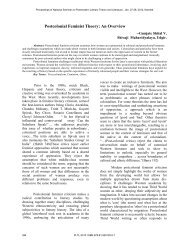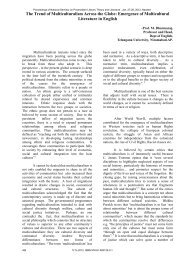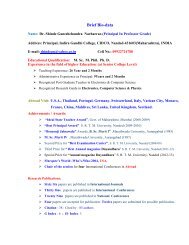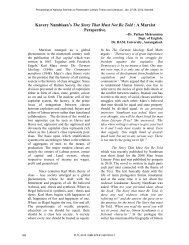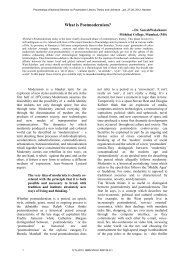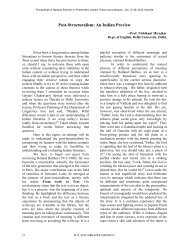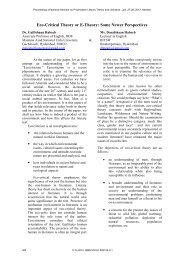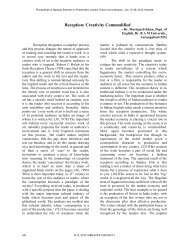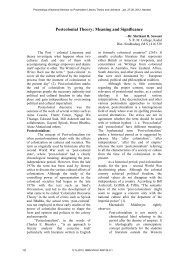Proceedings of National Seminar on Postmodern ... - Igcollege.org
Proceedings of National Seminar on Postmodern ... - Igcollege.org
Proceedings of National Seminar on Postmodern ... - Igcollege.org
You also want an ePaper? Increase the reach of your titles
YUMPU automatically turns print PDFs into web optimized ePapers that Google loves.
<str<strong>on</strong>g>Proceedings</str<strong>on</strong>g> <str<strong>on</strong>g>of</str<strong>on</strong>g> <str<strong>on</strong>g>Nati<strong>on</strong>al</str<strong>on</strong>g> <str<strong>on</strong>g>Seminar</str<strong>on</strong>g> <strong>on</strong> <strong>Postmodern</strong> Literary Theory and Literature , Jan. 27-28, 2012, Nanded<br />
Film Theory<br />
Film theory is an academic discipline that aims to explore the essence <str<strong>on</strong>g>of</str<strong>on</strong>g><br />
the Cinema and provides c<strong>on</strong>ceptual frame works for understanding film’s<br />
relati<strong>on</strong>ship to reality, the other Arts, individual viewers, and society at large.<br />
Film theory is not to be c<strong>on</strong>fused with general film criticism, though there can<br />
be some crossover between the two disciplines.<br />
French Philosopher Henri Bergs<strong>on</strong>’s “Matter and Memory” (1896) has<br />
been cited as anticipating the developments <str<strong>on</strong>g>of</str<strong>on</strong>g> film theory during the birth <str<strong>on</strong>g>of</str<strong>on</strong>g><br />
cinema. Bergs<strong>on</strong> coined the terms “The Movement Image” and “The Time<br />
Image”. Early film theory arose in the silent era and was mostly c<strong>on</strong>cerned with<br />
defining the crucial elements <str<strong>on</strong>g>of</str<strong>on</strong>g> the medium. This work is largely evolves from<br />
the works <str<strong>on</strong>g>of</str<strong>on</strong>g> directors, like Germaine Dulac, Louis Delluc, Jean Epstein, Sergei<br />
Eisenstein, Lev kweshov, and Dziga Vertoy and film theorists like Rudolf<br />
Arnmeim, Bela Balazs and Siegfried Kracher. These individuals emphasized<br />
how film differed from reality and how it might be c<strong>on</strong>sidered a valid art form.<br />
French film critic Andre Bazin Says.:<br />
“Film’s essence lay in its ability ,<br />
to mechanically reproduce reality;<br />
not in its difference from reality.”<br />
In 1960 and 1907s, film theory took up residence in academic importing<br />
c<strong>on</strong>cepts from established disciplines like Psychoanalysis, gender studies,<br />
anthropology, literary theory semiotics and linguistics.<br />
The late 1980s, or early 1990s, did film theory achieve much<br />
prominence in American universities by displacing the prevailing humanistic,<br />
auteur theory that had dominated cinema studies and which had been focused<br />
<strong>on</strong> the practical elements <str<strong>on</strong>g>of</str<strong>on</strong>g> film writing, producti<strong>on</strong>, editing and criticism.<br />
American scholar David Bordwell has spoken against many prominent<br />
developments film theory since the 1970s, i.e. he uses the humorously<br />
derogatory term “SLAB Theory” to refer to film studies based <strong>on</strong> the ideas <str<strong>on</strong>g>of</str<strong>on</strong>g><br />
Saussure, Lacan, Althusser, Barthes. Bordwell Promotes what he describers as<br />
“Ne<str<strong>on</strong>g>of</str<strong>on</strong>g>ormalism”. During 1990s, the digital revoluti<strong>on</strong> in image technologies<br />
had an impact <strong>on</strong> film theory in various ways. Film ability to capture an<br />
“indexicl” image <str<strong>on</strong>g>of</str<strong>on</strong>g> a moment in time by theorists like Mary Ann Doane, Philip<br />
Rosen, and Laura Mulvey who was informed by Psychoanalysis. A<br />
psychoanalytical perspective, Lacanian “ The Real”, Slavoj Zizek “The gaze”,<br />
extensively used in c<strong>on</strong>temporary film analysis.<br />
533 PLTL-2012: ISBN 978-81-920120-0-1



